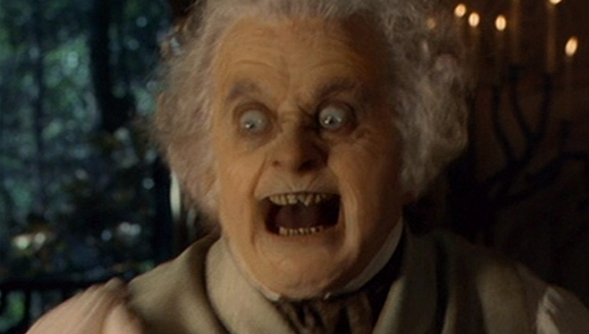 I’m not normally someone who indulges in all the micro-reporting that surrounds The Hobbit, but for Sir Ian Holm I’ll gladly make an exception. Peter Jackson announced on his official Facebook page that the actor will be returning to play the elder Bilbo Baggins in the two Hobbit films the director is currently shooting in New Zealand. This announcement came as sort of an afterthought, as Jackson was just clearing up a misconception that Holm was the voice of Bilbo at the end of the video blog (it was Martin Freeman who plays the younger version, if anyone cares). Holm will most likely be book ending the movies, telling the story to Frodo (the returning Elijah Wood) and smoking his sweet hobbit pipe.
I’m not normally someone who indulges in all the micro-reporting that surrounds The Hobbit, but for Sir Ian Holm I’ll gladly make an exception. Peter Jackson announced on his official Facebook page that the actor will be returning to play the elder Bilbo Baggins in the two Hobbit films the director is currently shooting in New Zealand. This announcement came as sort of an afterthought, as Jackson was just clearing up a misconception that Holm was the voice of Bilbo at the end of the video blog (it was Martin Freeman who plays the younger version, if anyone cares). Holm will most likely be book ending the movies, telling the story to Frodo (the returning Elijah Wood) and smoking his sweet hobbit pipe.
Is anyone else nervous about The Hobbit? Jackson didn’t even seem to want to make it until The Lovely Bones failed miserably and his re-casting of nearly everyone from The Lord of the Rings trilogy seems sort-of desperate/fan service. If my memory serves me correctly, The Hobbit doesn’t need everyone back (save for Gandalf and Gollum) since it’s its own story and a prequel in a sense to boot. I don’t know; I’m sure fans will probably dig it and attack anyone who doesn’t, but there’s just something about this that makes me uneasy.
The Hobbit, which will be split into two movies to further wring money out of the viewing public, is currently shooting and the first film will bow next December provided the world doesn’t end. Check out Jackson’s full note regarding Easter Break below.
Just arrived at our four-day Easter break, which will be a nice time to recharge batteries and do a few script tweaks for future scenes.
We always find there are three distinct phases in the life of a film script. First, it exists before the film starts shooting. In this period, which can last from months to years, the script is a theoretical document—an imaginative version of the movie.
Then you start shooting and things come much more into focus—usually in a very positive way. We now have actors who bring their skill to the roles and suddenly we see the characters in a more vivid and tangible way. This is both fun and satisfying, and always inspires us to embark on constant script revisions to meet the renewed potential these characters now have. I feel that much of the best writing happens during this period, but it does make a very busy time—very, very busy! Sometimes we have gotten these revisions to the actors a little late. We constantly joke to Ian McKellen that tomorrow’s script pages will be slid under his door sometime the night before… and sometimes that has been true.
The worst case of this came during The Fellowship of the Ring, when we revised Boromir’s long speech about Mordor at the last minute and only got it to Sean Bean on the day it was being shot. Sean handled it very cleverly—if you look at the movie, you’ll see he occasionally has his head bowed, as if dealing with the emotional weight of the horrors of Mordor. In actual fact, the new script page had been taped to his knee! By the time we were done with several takes and a few different camera angles, Sean had the speech down pat, and it was mainly those takes that were used in the final cut.
The final writing phase comes in post-production, when you edit the movie. No matter what you were imagining when you wrote the script, and what you imagined during the shoot, nothing now matters beyond the actual cut film. We often find that script work continues during post, including writing and shooting new scenes, reorganising the order of scenes, or recording additional dialogue to slip into shots. We do all of these things, and the writing only stops when the film is finally finished.
Many thanks for all the comments about the first posts. A few common questions have come up and I’ll answer some of those over the break. Now to get back to the script for those Rivendell scenes we have coming up…
Cheers,
Peter J
